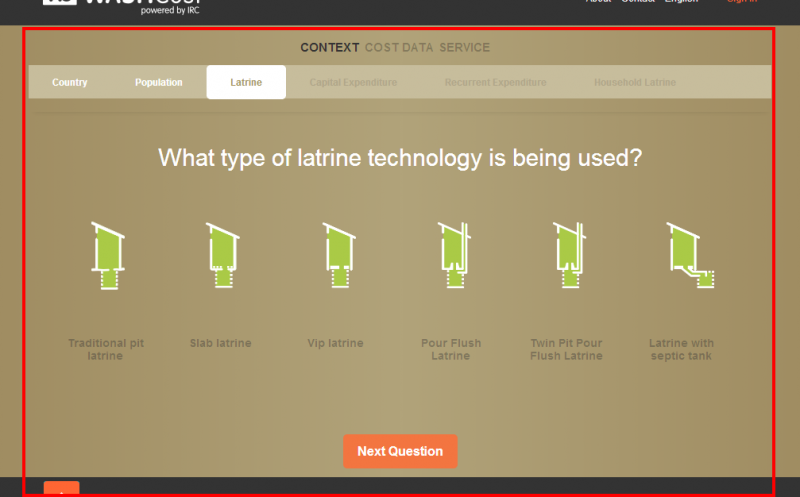- Markets, finance and governance
- Financing (taxes, tariffs, transfers) and cost estimates
- Re: Toolkit, guideline and excel model for a standardised approach to cost-benefit analysis
Re: Toolkit, guideline and excel model for a standardised approach to cost-benefit analysis
24.3k views
- bhagwan
-
- User is blocked
Less- Posts: 2
- Likes received: 1
- kharallaxman
-
 Less
Less- Posts: 37
- Karma: 2
- Likes received: 8
- dietvorst
-
 Less
Less- Posts: 93
- Karma: 13
- Likes received: 67
Re: Toolkit, guideline and excel model for a standardised approach to cost-benefit analysis
IRC, Water for People and Aguaconsult have developed the following set of Excel Costing and Budgeting Tools:
- Asset Registry Assessment Tool
- Cash Flow Analysis Tool
- Direct Support Cost Tool
- Financial Overview Tool (revenue and expenditure at the service authority level)
You may also find this new WHO/IRC publication useful:
Smits, S. & Fonseca, C., 2020. Costing and financing of small-scale water supply and sanitation services . Copenhagen, Denmark: WHO Regional Office for Europe. x, 39 p. : 8 boxes, 4 fig., 2 tab.
Guidelines for European national and subnational policy-makers responsible for sustainable financing of small-scale water and sanitation services, based on a life-cycle cost assessment and the three potential sources of finance: tariffs, taxes and transfers. Read more
Information Manager
Programme Officer | IRC
+31 70 304 4014 | This email address is being protected from spambots. You need JavaScript enabled to view it. | www.ircwash.org
Skype cor.dietvorst | Twitter @dietvorst
Please Log in to join the conversation.
You need to login to reply- Elisabeth
-
- User is blocked
- Freelance consultant since 2012
Less- Posts: 3372
- Karma: 54
- Likes received: 932
Re: Toolkit, guideline and excel model for a standardised approach to cost-benefit analysis
Do you mean this document that was mentioned above?:
Collecting life-cycle cost data for WASH services : a guide for practitioners
Fonseca, C. , Veenkant, M. (2019)
www.ircwash.org/resources/collecting-lif...-guide-practitionersThis document is a step-by-step guide to collecting data for a life-cycle cost approach (LCCA) to water service delivery at the district level. Its a guide for collecting data, conducting surveys and interviews, and contextualising the information. It addresses water services but is equally useful for assessing sanitation services. The guidance was developed for Ethiopia; for other countries, some terms may need to be adapted. The goals and realities of the project or programme in which the LCCA is applied may require you to be innovative and deviate from the outlined approach.
I couldn't find an Excel file though. Let's find out from IRC.
Regards,
Elisabeth
Freelance consultant on environmental and climate projects
Please Log in to join the conversation.
You need to login to reply- bhagwan
-
- User is blocked
Less- Posts: 2
- Likes received: 1
- kharallaxman
-
 Less
Less- Posts: 37
- Karma: 2
- Likes received: 8
Re: Toolkit, guideline and excel model for a standardised approach to cost-benefit analysis
Best regards,
Laxman
Please Log in to join the conversation.
You need to login to reply- dietvorst
-
 Less
Less- Posts: 93
- Karma: 13
- Likes received: 67
You can already start using the tool at washcost.ircwash.org
For more information read Do the Math, Make it Last
Information Manager
Programme Officer | IRC
+31 70 304 4014 | This email address is being protected from spambots. You need JavaScript enabled to view it. | www.ircwash.org
Skype cor.dietvorst | Twitter @dietvorst
Please Log in to join the conversation.
You need to login to replyFirst of all, thank you very much for going through the WASHCost Calculator and taking the time to provide your feedback here. This is very valuable. Also, my apologies for the delay in getting back to you.
We've been busy preparing the advanced tool, which I think will have quite a lot of the functionality that you would like to see in the basic tool. We are a bit behind our original timeline. Based on user feedback, we are now working on a new version of the basic tool, which will have a clearer introduction and report page to clarify some common questions as well.
The main purpose of the basic tool is to act as a quick introduction to the life-cycle costs of sanitation and to encourage people to start using the advanced tool (available in December) and start thinking about the financial sustainability of services. So the options are limited to make it a quick exploration. In the future, the output pages can be shared and that will be a nice way to introduce people to the concept of life-cycle costs and measuring services. I think the advanced tool will be more interesting for you.
Regarding the toilet options, in the advanced tool, each technology option can be further refined to also include things like urine diversion. Please check our new blog, which gives an example of some of the advanced tool inputs: blog.washcost.org/washcost-calculator/venkatapuram-1/
Tomorrow we will post the outputs blog. Please do share your thoughts.
Regarding the impermeable slab, this has to do with the floor of the latrine, not the pit.
The calculator is a learning tool in which people are encouraged to input whatever data they have before any suggestions are made. The idea is that when people come to the output page, they will then be able to click back to the various input pages to change their answers and explore different options. We are also looking at how we can improve the guidance and help text around these questions so that users are encouraged to simply click an answer within the benchmark range if they are unsure.
Taking this approach is particularly important in the advanced tool where we hope to start being able to provide comparisons with user inputted data. Until people provide the input, we have research like WASHCost to provide some kind of indication when we all know that the technology, region and even management of services can have a big impact on costs. But I'm convinced we can improve the availability of data in the sector. For that reason, we prefer the design of a tool that learns from users and begins to become smarter over time rather than a tool that is preprogrammed with some answers.
Until all the data is there, people can still use the tool to do basic life-cycle costs analysis that may have been difficult otherwise and they can also use it to generate nice reports. I'm glad you like the visuals.
If it turns out there is more demand to see numbers in terms of $ / person / day, we can certainly accommodate that. At the same time, we have benchmarks based on mostly real expenditure data and sometimes supplemented with figures from literature where data is scarce.
As capital expenditures are incurred before the service can start, we prefer to show these as a single separate value. The recurrent expenditure then is a separate value (now $ / person / year), which also includes capital maintenance, e.g. the cost of rehabilitating or replacing facilities.
Perhaps one note: in the future, I hope that people will start to create their own output formats for the Calculator or build sanitation finance and business that can connect to the calculator.
It's important to point out that it is an open source project and that we also provide an API, which allows people with other databases, information systems and tools to interact with the data and outputs they have in the WASHCost Calculator. IRC will continue to provide the tool as a free service but we hope we to get new valuable functionalities from the community as well and see people use it in ways we did not imagine.
There are many excel based tools out there with lots of valuable data and it would be great if they could start interacting with the WASHCost Calculator as well.
washnote.com
Please Log in to join the conversation.
You need to login to reply- Elisabeth
-
- User is blocked
- Freelance consultant since 2012
Less- Posts: 3372
- Karma: 54
- Likes received: 932
Re: washcost calculator
Has anyone else tried out the WASHCost Calculator Tool yet? I gave it a quick test this morning and have a couple of brief observations.
Here is the link to the website:
washcost.org/cal
Only the basic tool is available for now. I am curious which additional functionalities the advanced tool will have.
The user interface is really nice, very graphical, very pretty!
I was a bit disappointed by the small number of toilet options to choose from, see screenshot:
(obviously, UDDTs is not amongst them; probably the reason is that the pilot countries didn't deliever sufficient costing data on the UDDTs? Mind you, later in the piece the user anyway has to enter the capital and O&M cost; thus why could the UDDT not be included?)
Later the user is being asked if the toilet has a permeably slab or an impermeable slab. This is worded in a misleading way. It should be: is it completely sealed at the bottom or not. Show me a pit latrine that is completely sealed - then it is no longer a pit latrine - are you talking of a holding tank?
I was somehow expecting that the tool would give the user the capital costs and the O&M costs, but no, these have to be added by the user (maybe the advanced tool will give the costs?).
Finally, the end result is a huge fat number (Life Cycle Cost), which does not mean anything to me... (haveing that benchmark information will be useful).
Therefore, my suggestion is how about you also provide the calculated figure for the daily cost using the equation to annualise the capital costs? I wrote about it here on the forum:
forum.susana.org/forum/categories/139-ge...mit=12&start=12#5534
Would that be feasible? At least that figure (in $/user/day) would be more easy to grasp by the average user of the tool.
Kind regards,
Elisabeth
Freelance consultant on environmental and climate projects
Attachments:
-
 WashCostBa...ype2.png
(Filesize: 203KB)
WashCostBa...ype2.png
(Filesize: 203KB)
Please Log in to join the conversation.
You need to login to replyThanks for your messages and for following our progress. The discussion on the Susana forum has been great. Please let me know if you would like early access to the tools as testers and could provide us some feedback.
For your information, we have only just started user testing of the basic tool about a week ago and based on that there will be a public version available in Stockholm. The basic tool is quite limited in scope but should be useful for initial exposure and learning about life-cycle costs and to do some very simple life-cycle costs analysis.
The advanced tool is not ready yet but I'll be presenting the functionality and what it will look like at the Stockholm World Water Week and in our blog, where you can find all our updates: www.washcost.org/blog
I hope that we can now continue this important discussion on how to make an appropriate life-cycle costs analysis tool for sanitation. I know that there will be lively debates, as always, on the right indicators but I hope that the tool we are producing now will at least enable people to start sharing some data in a comparable way.
Nick Dickinson
Follow us on twitter too!
www.twitter.com/washcostcal
www.twitter.com/waternote
washnote.com
Please Log in to join the conversation.
You need to login to reply- jonpar
-
- As part of the Engineering team, my role at IMC is to lead on the delivery of projects requiring specific expertise on urban sanitation (including excreta/waste/wastewater/stormwater management) focusing on technical, institutional and financial aspects in project design and implementation.
Less- Posts: 223
- Karma: 24
- Likes received: 87
Round table on life-cycle costing tools: their future and value
Thursday, September 5
Time: 13h30 – 15h30 GMT +1
Location: Room M13
From district level annual planning to large scale infrastructure projects, professionals should have access to the best available life-cycle costs in order to establish WASH services that last beyond the life-time of a typical project. Two of the latest life-cycle costing tools will be presented by Water For People (Kate Fogelberg) and IRC (Nick Dickinson) as well as a rapid review of other existing financial tools for water and sanitation. The presentations will be followed by open discussion on what users are looking for in a life-cycle costing tool.
This event is open to all. We’ll be inviting a combination of those working with the life-cycle costing approach, potential large institutional and project users of these tools, and individuals and organizations who support the on-going development of these tools and/or are interested in improving access crucial WASH information, especially on expenditure and service levels.
Space is limited so email washcostcalculator [AT] irc.nl if you are interested in reserving a seat.
Principal Consultant – Water and Sanitation
IMC Worldwide Ltd, Redhill, United Kingdom
Email: This email address is being protected from spambots. You need JavaScript enabled to view it.
Skype : jonathanparkinson1
Please Log in to join the conversation.
You need to login to reply- jonpar
-
- As part of the Engineering team, my role at IMC is to lead on the delivery of projects requiring specific expertise on urban sanitation (including excreta/waste/wastewater/stormwater management) focusing on technical, institutional and financial aspects in project design and implementation.
Less- Posts: 223
- Karma: 24
- Likes received: 87
WASHCost Calculator exhibition at Stockholm World Water Week
Monday, September 2 – Thursday, September 5
Location: Exhibition floor – Standnumber B03:6,
If you are attending Stockholm World Water Week, please plan to attend the WASHCost round table discussion to look at the existing life-cycle costing tools that help the WASH sector improve access to life-cycle costs data and analysis.
The WASHCost calculator will be on the exhibition floor where we welcome people to test the beta version of the WASHCost calculator for water and sanitation.
Feedback from the user community at Stockholm will shape functionalities of the tool as IRC continues with development of the public version.
Principal Consultant – Water and Sanitation
IMC Worldwide Ltd, Redhill, United Kingdom
Email: This email address is being protected from spambots. You need JavaScript enabled to view it.
Skype : jonathanparkinson1
Please Log in to join the conversation.
You need to login to reply- Markets, finance and governance
- Financing (taxes, tariffs, transfers) and cost estimates
- Re: Toolkit, guideline and excel model for a standardised approach to cost-benefit analysis








